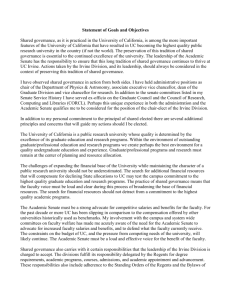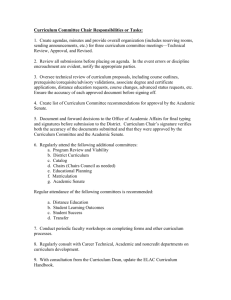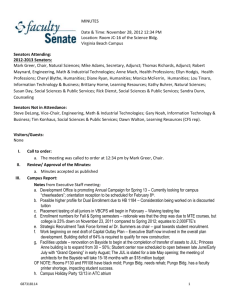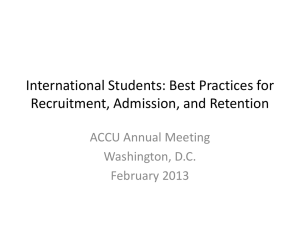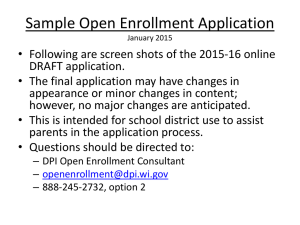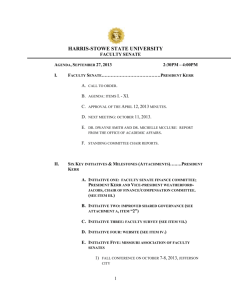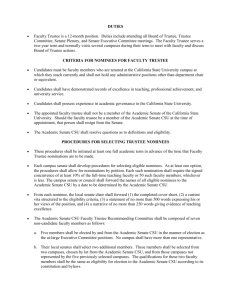EPC 04-07 - California State University, Dominguez Hills
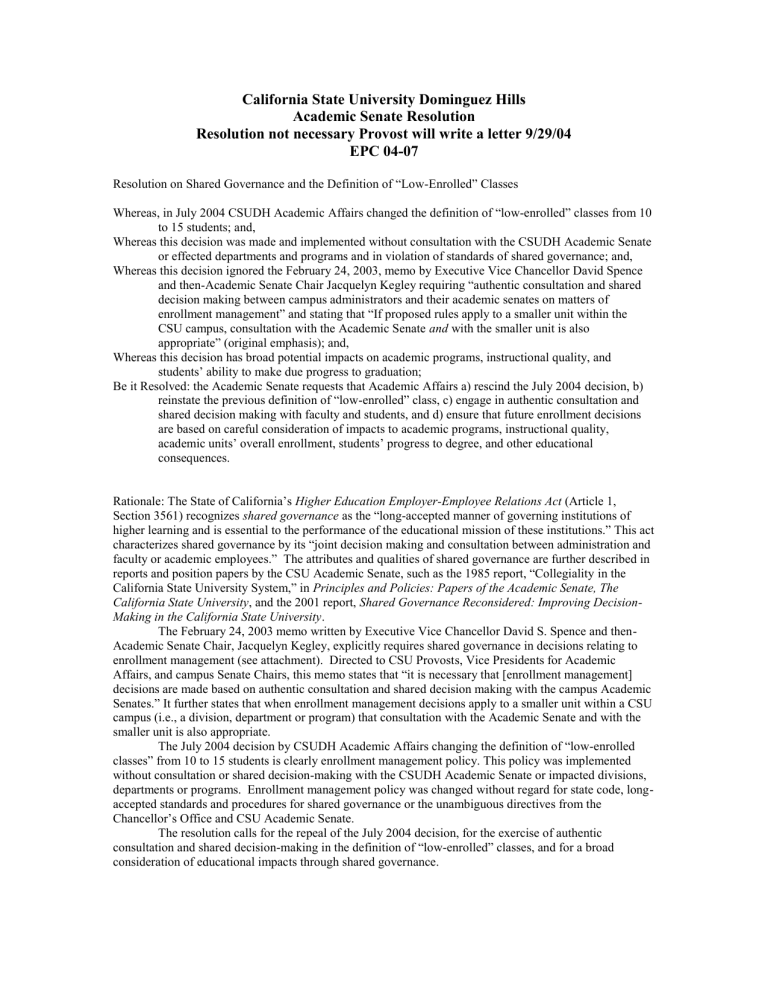
California State University Dominguez Hills
Academic Senate Resolution
Resolution not necessary Provost will write a letter 9/29/04
EPC 04-07
Resolution on Shared Governance and the Definition of “Low-Enrolled” Classes
Whereas, in July 2004 CSUDH Academic Affairs changed the definition of “low-enrolled” classes from 10 to 15 students; and,
Whereas this decision was made and implemented without consultation with the CSUDH Academic Senate or effected departments and programs and in violation of standards of shared governance; and,
Whereas this decision ignored the February 24, 2003, memo by Executive Vice Chancellor David Spence and then-Academic Senate Chair Jacquelyn Kegley requiring “authentic consultation and shared decision making between campus administrators and their academic senates on matters of enrollment management” and stating that “If proposed rules apply to a smaller unit within the
CSU campus, consultation with the Academic Senate and with the smaller unit is also appropriate” (original emphasis); and,
Whereas this decision has broad potential impacts on academic programs, instructional quality, and students’ ability to make due progress to graduation;
Be it Resolved: the Academic Senate requests that Academic Affairs a) rescind the July 2004 decision, b) reinstate the previous definition of “low-enrolled” class, c) engage in authentic consultation and shared decision making with faculty and students, and d) ensure that future enrollment decisions are based on careful consideration of impacts to academic programs, instructional quality, academic units’ overall enrollment, students’ progress to degree, and other educational consequences.
Rationale: The State of California’s Higher Education Employer-Employee Relations Act (Article 1,
Section 3561) recognizes shared governance as the “long-accepted manner of governing institutions of higher learning and is essential to the performance of the educational mission of these institutions.” This act characterizes shared governance by its “joint decision making and consultation between administration and faculty or academic employees.” The attributes and qualities of shared governance are further described in reports and position papers by the CSU Academic Senate, such as the 1985 report, “Collegiality in the
California State University System,” in Principles and Policies: Papers of the Academic Senate, The
California State University , and the 2001 report, Shared Governance Reconsidered: Improving Decision-
Making in the California State University .
The February 24, 2003 memo written by Executive Vice Chancellor David S. Spence and then-
Academic Senate Chair, Jacquelyn Kegley, explicitly requires shared governance in decisions relating to enrollment management (see attachment). Directed to CSU Provosts, Vice Presidents for Academic
Affairs, and campus Senate Chairs, this memo states that “it is necessary that [enrollment management] decisions are made based on authentic consultation and shared decision making with the campus Academic
Senates.” It further states that when enrollment management decisions apply to a smaller unit within a CSU campus (i.e., a division, department or program) that consultation with the Academic Senate and with the smaller unit is also appropriate.
The July 2004 decision by CSUDH Academic Affairs changing the definition of “low-enrolled classes” from 10 to 15 students is clearly enrollment management policy. This policy was implemented without consultation or shared decision-making with the CSUDH Academic Senate or impacted divisions, departments or programs. Enrollment management policy was changed without regard for state code, longaccepted standards and procedures for shared governance or the unambiguous directives from the
Chancellor’s Office and CSU Academic Senate.
The resolution calls for the repeal of the July 2004 decision, for the exercise of authentic consultation and shared decision-making in the definition of “low-enrolled” classes, and for a broad consideration of educational impacts through shared governance.


